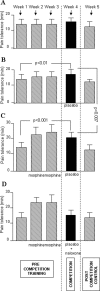Opioid-mediated placebo responses boost pain endurance and physical performance: is it doping in sport competitions?
- PMID: 17978033
- PMCID: PMC6673345
- DOI: 10.1523/JNEUROSCI.3330-07.2007
Opioid-mediated placebo responses boost pain endurance and physical performance: is it doping in sport competitions?
Abstract
The neurobiological investigation of the placebo effect has shown that placebos can activate the endogenous opioid systems in some conditions. So far, the impact of this finding has been within the context of the clinical setting. Here we present an experiment that simulates a sport competition, a situation in which opioids are considered to be illegal drugs. After repeated administrations of morphine in the precompetition training phase, its replacement with a placebo on the day of competition induced an opioid-mediated increase of pain endurance and physical performance, although no illegal drug was administered. The placebo analgesic responses were obtained after two morphine administrations that were separated as long as 1 week from each other. These long time intervals indicate that the pharmacological conditioning procedure has long-lasting effects and that opioid-mediated placebo responses may have practical implications and applications. For example, in the context of the present sport simulation, athletes can be preconditioned with morphine and then a placebo can be given just before competition, thus avoiding administration of the illegal drug on the competition day. However, these morphine-like effects of placebos raise the important question whether opioid-mediated placebo responses are ethically acceptable in sport competitions or whether they have to be considered a doping procedure in all respects.
Figures



References
-
- Ader R, Cohen N. Behaviorally conditioned immunosuppression and murine systemic lupus erythematosus. Science. 1982;215:1534–1536. - PubMed
-
- Benedetti F, Colloca L, Torre E, Lanotte M, Melcarne A, Pesare M, Brgamasco B, Lopiano L. Placebo-responsive Parkinson patients show decreased activity in single neurons of subthalamic nucleus. Nat Neurosci. 2004;7:587–588. - PubMed
Publication types
MeSH terms
Substances
LinkOut - more resources
Full Text Sources
Medical
